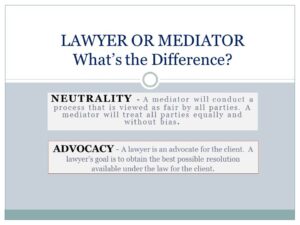Divorce Mediation in Wa Requires a Mediator to be a Neutral Party
Lawyers and mediators have very different roles in the Wa divorce mediation process.

Only a Wa State Lawyer, not a Mediator, can provide Legal Advice.
The role of a lawyer and a mediator in divorce mediation are quite different.
The Lawyer’s Role in Divorce Mediation
A lawyer is an advocate who represents their client’s interests. Generally, a lawyer’s role, in addition to providing legal advice, is to present legal arguments to persuade an opposing lawyer or judge to rule in their client’s favor on a disputed issue.
In divorce mediation, a lawyer’s role is to present their client’s legal arguments, and defend their client’s legal position, to obtain as favorable a settlement as they can. It is NOT to persuade a mediator – though that often appears to be the case to client. It is to persuade the other attorney, and ultimately their client, to accept a proposed settlement or risk losing in court.
The Mediator’s Role in Divorce Mediation
While a divorce mediator is usually a licensed attorney, the mediator cannot act as an attorney. A mediator may provide legal information to educate the parties but cannot give legally advise. They are “neutral” and must remain so to fulfill their role of getting spouses to agree to a fair settlement.
To unsuspecting parties, legal advise from a divorce mediator may be accepted as “the law”. It is not. It is one attorney’s legal opinion and not conclusive. As a result, a divorce mediator who gives a legal opinion on how the law applies to the case facts is improperly playing the role of a lawyer advocate.
A Mediator Cannot Also Act as One Spouse’s lawyer
You cannot be neutral if you are also acting as a spouse’s lawyer in the same case. There is a conflict of interest between the two roles – a lawyer makes legal arguments on one party’s behalf while a neutral tries to settle cases amicably without taking sides.
When A Divorce Mediator Also Acts As One Spouse’s Lawyer, An Unfair Settlement is Inevitable
The different roles of a lawyer and mediator, and the consequences when those roles improperly overlap, can be illustrated by a real life example.
A client recently came in for a consult after using a divorce mediator to obtain settlement. He was very anxious about its terms which he did not fully understand and wanted them clarified and, if possible, changed.
A Botched Divorce Mediation Process
The rule requiring a mediator to be neutral was broken in his case. The parties hired a mediator, (also a licensed Seattle attorney), to settle contested issues. During their joint mediation sessions, the mediator legally advised him that, under Washington family law, his wife would be the primary parent, his visitations would be “the standard” alternate weekend schedule, and Wa. law necessitated he pay spousal maintenance – all impermissible legal advice. He now felt the mediator unfairly interpreted the law in his ex-wife’s favor.
In reviewing the “mediated” Divorce Decree and accompanying paperwork. I learned the “mediator” had also signed the final orders as the wife’s attorney. In his case, the divorce mediator also acted as his ex-wife’s divorce attorney. Without his knowledge, the mediator had also acted as his wife’s lawyer. The result was a unfair settlement heavily skewed in the wife’s favor, depriving him of parenting time that will require lengthy and expensive court action to try to fix.
How to Make Sure Your Divorce Mediator is Neutral
The following tips will help you avoid the above pitfalls of hiring a biased divorce mediator:
1) Hire an experienced, trustworthy divorce mediator to mediate your case. Make sure the mediation fee agreement clearly describes the mediator’s neutral role. If, during the divorce mediation, the mediator is dismissive of your legal claims, the legal opinions of a lawyer who has advised you, and/or strongly favors your spouse’s views without explanation, get a new divorce mediator;
2) Obtain a lawyer to advise you before the mediation session as to your rights and what to expect. A divorce mediator should always suggest doing so.
Ideally, you will want a lawyer at the divorce mediation to make sure the process is fair and to prevent either the mediator or opposing party, or both, from trying to impose a settlement;
3) Obtain a lawyer to review review the proposed settlement before signing it if its terms are unclear to you or you are concerned improprieties occurred during the divorce mediation process.
At Weintraub Law Office, we provide ethical, neutral, and experienced divorce and family law mediation services.
Call Weintraub Law Office at +1 425 374 4045 or contact us online to learn about out mediation services.
